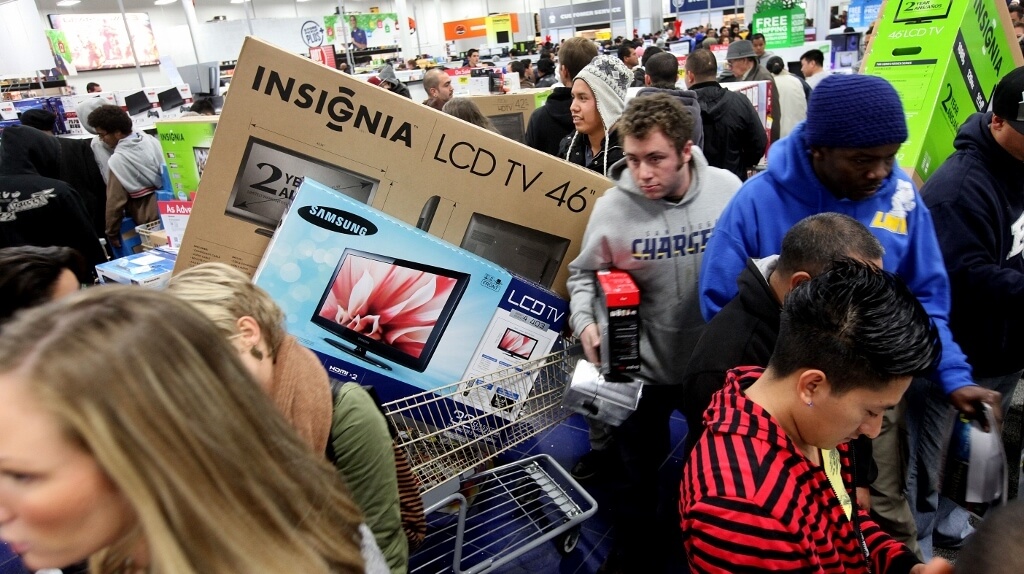Black Friday deals, while seemingly beneficial for consumers seeking discounts, can compromise the brand messaging and principles of small businesses.
Navigating The Black Friday Dilemma: The Small Business Perspective
Black Friday deals, while seemingly beneficial for consumers seeking discounts, can compromise the brand messaging and principles of small businesses.

Black Friday has undergone a profound transformation. What was a 24-hour sprint for deals following on from Thanksgiving gatherings has now blossomed into a week-long extravaganza of discounts. More than a week, in some cases. As consumers are able to revel in the extended shopping spectacle, it’s important to reflect on the impact of this elongated sales period, particularly on small and medium-sized enterprises (SMEs).
As managing director of a toy and leisure company, who’s proud of our origins, independence and products, I’d like to unpack the Black Friday dilemma from the standpoint of small businesses. There are ethical, financial, and logistical considerations that prompt some of us to stand against the tide of this annual shopping event.
The Small Business Standpoint
Small businesses, often considered the lifeblood of local economies, may choose to reject the allure of Black Friday deals for reasons deeply rooted in their values, sustainability and longevity:
Compromised brand messaging and principles
Black Friday deals, while seemingly beneficial for consumers seeking discounts, can compromise the brand messaging and principles of small businesses in several ways:
- Cost over quality: Black Friday is often associated with steep discounts, giving the perception that the primary value lies in cost savings rather than the quality or uniqueness of the product. For small businesses that prioritise craftsmanship, ethical sourcing, and attention to detail, the focus on discounted prices can undermine the brand's commitment to excellence.
- Quantity over quality: The urgency and competitiveness associated with Black Friday can lead to a surge in sales driven by the desire for volume rather than fostering long-term customer relationships.
- Undermining fair pricing: Small businesses often set their prices based on the true value of their products, considering factors such as quality of materials, fair wages, and sustainable practices. Black Friday's emphasis on deep discounts may convey a message that the regular prices were inflated, potentially undermining the business's commitment to fair pricing.
- Impact on brand image: Participating in Black Friday deals can sometimes clash with a small business's carefully crafted brand image. If the brand is built on values such as sustainability, ethical production, or exclusivity, the association with a mass-market discount event might dilute the brand's perceived uniqueness and authenticity.
Financial implications
Participating in Black Friday can have a number of negative financial implications for small businesses:
- Thin profit margins: Small businesses, particularly those in retail or e-commerce, may operate on thin profit margins. Offering significant discounts on Black Friday can further erode these margins, potentially leading to financial losses rather than gains.
- Increased operational costs: Handling the increased volume of orders, customer inquiries, and shipping during Black Friday requires additional resources. Small businesses may need to do things such as hire temporary staff which contributes to higher operational expenses.
- Customer acquisition vs. retention: While Black Friday can attract new customers, the focus on one-time deals may not necessarily foster long-term customer loyalty. Small businesses could find themselves spending resources on acquiring new customers rather than nurturing existing relationships.
- Returns: Black Friday purchases are often driven by impulse and the desire for quick deals. This can lead to a higher rate of returns which not only affect immediate revenue but also incur additional costs related to restocking and processing.
- Cash flow problems: Black Friday sales may result in a surge of revenue, but the timing of this income might not align with when bills and expenses are due. Small businesses could face cash flow strain as a result.
- Discounting perception: Not only does discounting suggest a focus on cost over quality, but consistently participating in Black Friday sales might condition customers to expect discounts regularly. This can make it challenging for small businesses to sell products or services at regular prices outside of promotional periods.
Consumer Benefits
Choosing to support small businesses in their decision to avoid Black Friday discounts has a number of consumer benefits:
- A moral standpoint: Supporting small businesses often means backing enterprises that prioritise fair labour practices, community engagement, and a commitment to quality. By opting for products from SMEs, consumers contribute to the livelihoods of local entrepreneurs and foster a more sustainable economic ecosystem. In contrast, the frenzied nature of Black Friday sales can lead to a disregard for ethical sourcing and production practices in the pursuit of maximizing profits.
- Sustainability: Many small businesses inherently adopt sustainable practices, whether it's in sourcing materials, reducing waste, or focusing on longevity rather than disposability. By supporting them, consumers actively participate in fostering a more environmentally conscious marketplace. In contrast, the overconsumption associated with Black Friday can contribute to the culture of disposable goods, generating unnecessary waste and environmental strain.
- Consideration of the cost-of-living crisis: While Black Friday may seem like an opportunity to save money, the emphasis on discounts can sometimes distract from the true cost of a product. Supporting SMEs and adhering to RRPs often means recognizing the fair value of a product and investing in items that are built to last. This approach aligns with conscientious consumerism, encouraging consumers to think beyond short-term savings and consider the long-term value of their purchases.
- Less is more: Disengaging from the Black Friday flurry event allows consumers to cultivate a more intentional and clutter-free lifestyle. It's about making decisions based on genuine needs and preferences rather than succumbing to the pressure of sales and the fear of missing out. This mindful approach not only benefits the consumer in terms of mental and emotional well-being but also contributes to a more sustainable and thoughtful consumer culture overall.
Rethinking Black Friday
It’s important for both customers and businesses alike to look beyond the immediate draw of Black Friday deals and consider the long-term consequences of their decisions.
For customers, this means adopting sustainable consumer practices, prioritising quality over quantity, and building lasting loyalty through thoughtful choices.
For businesses, this means focusing on avoiding overstock issues, maintaining brand image and values, and balancing short-term gains with long-term goals.
By thinking beyond Black Friday, individuals and businesses alike contribute to a more sustainable, informed, and resilient consumer culture and ultimately foster longer lasting success.
Steve Finch is co-founder of Click Europe.
Thanks for signing up to Minutehack alerts.
Brilliant editorials heading your way soon.
Okay, Thanks!

